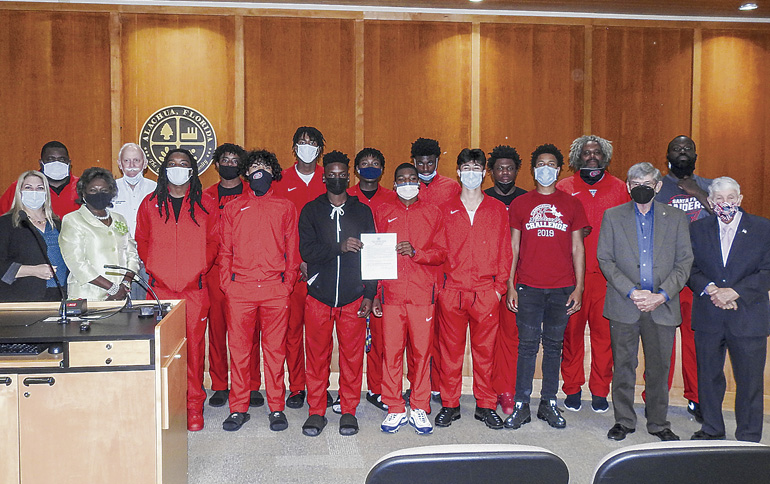ALACHUA – It's a historic year for basketball at Santa Fe High School, and the Alachua City Commission just tacked on a notable tribute. The City Commission proclaimed April 12, 2021 as Santa Fe School Raider Boy's Basketball Team Day in recognition of the team’s historic season. The team compiled a 20-6 record, with a #6 ranking in the state and reached the school's first-ever Class 4-A State Championship game.
The level of success attained by this team has never before been reached by a basketball team at Santa Fe High School. Head Coach Elliot Harris, who is also the City's Parks and Recreation Director, praised the team for their hard work, dedication and a “never –quit” attitude that propelled the team to the championship game. He also pointed out that while some prominent schools recruit players, the Santa Fe team is made up of all local boys.
Communications Division
The Commission also announced that each year the second full week of April is "National Public Safety Telecommunications Week," recognizing the dedicated men and women who serve as public safety telecommunicators.
The City of Alachua Police Department has its own telecommunications section, referred to as the Communications Division, which is comprised of six full-time employees and a supervisor. These people are the 911 operators who are the first line of communication between the police and citizens who need help, and they handle all incoming emergency calls to the Alachua Police Department, including 911 transfers from the Alachua County Sheriff's Office, dispatching and monitoring of radio traffic for all officers responding to and initiating calls for service, as well as walk-ins at the station. The Commission recognized their dedication and service as a vital component of public safety services provided to citizens of Alachua.
KFC
Kentucky Fried Chicken may soon be among the dining choices in Alachua. The City has received a site plan application for a proposed development of a quick service KFC restaurant with drive-through facilities. The site plan proposes the construction of a 1,904 square-foot restaurant with drive-through service and associated improvements on a 1.06-acre property that is currently undeveloped and wooded. The plan is currently under review by city staff regarding required tree mitigation.
The plan shows126 regulated trees and four heritage trees are proposed for removal. According to the project’s landscape architect, the majority of the trees proposed for removal are of an undesirable species, present potential long-term safety and maintenance issues, and interfere with the required utilities needed to serve the development. City Land Development Regulations require that new trees be planted to replace removed healthy regulated trees.
The plan would require 222 trees to be planted to mitigate for those proposed for removal. If a developer cannot replace the trees removed at their site, they can petition for an offsite mitigation where the trees would be planted on city property at other sites. The plan proposes to provide a total of 29 replacement trees on-site to partially mitigate for those proposed for removal.
The architect has requested the City consider off-site mitigation for those 193 trees that cannot be accommodated through on-site mitigation due to the location of the proposed buildings, parking, and code-required tree plantings. The developer has estimated the cost for off-site mitigation is $30,602, and that fee must be paid to the City prior to any public hearing related to the proposed site plan.
City’s Economic Development Plans
Assistant City Manager Kamal Latham delivered a presentation entitled “The BEST Business Climate: City of Alachua 5-Year Economic Development Strategy.” BEST is an acronym for Business growth; Equity capital access; Sense of community and Talent development and recruitment.
“The City has outstanding public infrastructure, impressive financial stewardship, top-tier recreational facilities, diverse cultural programming, strong compliance and risk management, sound personnel policies, excellent law enforcement, first-rate planning, and inspired community development,” said Latham. “These attributes make Alachua a well-run city and great place to live, work, and play.” With this foundation, Latham proposes a multi-year economic development strategy that builds upon existing success and helps break new ground for the City to provide more economic opportunities for its residents. The Commission approved the plan unanimously.
Legal Services Renewed
Since 2003, the City of Alachua has contracted with the law firm of Robert A. Rush, P.A. to provide legal services to the City. Pursuant to the agreement, attorney Marian B. Rush has been designated as the City Attorney. Since Oct. 1, 2010, activities of the City Attorney have been billed at a monthly retainer amount of $10,000, totaling $120,000 annually. The City last renegotiated a contract with the firm effective Oct. 1, 2018. At the April 12 meeting, the Commission approved an extension of the contract and an increased monthly retainer of $11,500, the first increase in more than 10 years.
# # #
Email rcarson@
alachuatoday.com
Add a comment

